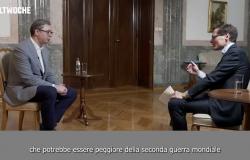The Soviet Union also collapsed because its structure pushed it towards aimperial hyperextension who was, in the end, suicidal. Soviet leaders realized too late that their system was not strong enough to direct attacks and continuous interference four continents: from Central Europe to Afghanistan, Eritrea, Angola, up to Cuba.
Today we Westerners would very much like the same to be true for Putin’s Russia, and yet all that remains two possibilities. Or is it the dictator in the Kremlin who does not understand that Russia cannot sustain for long the war in Ukrainealong with his presence in Syriato theinfiltration into Libya, Niger or Central African Republic and its covered operations in Europe; or it could be Western governments who do not want to see the opposite reality: that Putin’s Russia, for the moment, is able to continue (also) because the sanctions against Moscow are designed – and applied – inadequately.
Right now the European Central Bank is asking Italian, German and Austrian institutions to accelerate their phasing exit from Russia. It certainly makes sense – especially for Raiffeisen in Vienna, which is moving in the opposite direction – but it is a double-edged sword: today those banks are predominantly a channel not for the outflow of capital, therefore of bleeding of the Putinian system.
What really brings capital to Moscow is the petrolium. As he points out Sergey Vakulenkoa former top manager of Gazprom’s oil subsidiary who has been in exile for over two years, Russia recently returned to invoice from exports of its main raw material as in the pre-war period: about 15 billion dollars a month from crude oil, plus five from fuel. And compared even just to 2022, the difference is that today the Tax revenue of each barrel is higher because the government started taxing the product upon extraction from the ground.
There is therefore a common thread that ties together apparently different dynamics: the success of Russian oil on the markets, the devastation of Ukraine and the Putin’s popularity at home. Not just because revenues from fossil fuels form almost half of the budget, but for the trends and use of that revenue. 2024 predicts a 16% increase in spending pushed by amilitary budget explosion by 70% and by a series of social subsidies, designed to give the public the feeling that everything is normal despite the 400 thousand Russian dead and wounded in the meat grinder of conflict. So Russia can go on for years, rearming itself and chloroforming the population with subsidies.
In Putin’s offered social pact, says the dissident Andrei Kolesnikov, the majority supports the war “as long as you can do it from the sofa.” The dictator must give his subjects the Orwellian impression that the country’s living standards remain intact, while he sends their children to massacre and be massacred in Ukraine. Public money serves both strategies: aggression on the outside and sedation on the inside. And oil is the key to money: in 2024 the Kremlin expects it to give a revenue increased by 30% and this – observes Vakulenko – presupposes high barrel prices, combined with very low costs of circumventing sanctions.
This is exactly what the West is granting to Vladimir Putin. The G7 has indeed indicated a price ceiling on oil sales a 60 dollars a barrel, with the threat of sanctions on those who buy at higher prices. But the circumventions are disconcertingly simple: the owner of the cargo, the shipowner or the insurer of an oil tanker full of Russian crude oil only needs one certificate of the seller according to which the product will not be sold above the G7 “ceiling”. THE limits hey prohibitions exports to Europe are systematically made violated. A third of crude oil is bought from China, Certain. But one third of sales occurs thanks to Western ships or insurancesecond Isaac Levi of the Center for Research on Energy in Helsinki.
This isn’t a coincidence either. THE Western politicians they close both eyes because they fear that, otherwise, an increase in the world price of oil also affects their countries and therefore consensus for the same governments that are supporting Ukraine. Russia alone represents more than a tenth of world crude oil exports: sanctions that remove part of that product from the market would increase prices at the petrol pump for everyone. And ultimately the G7 governments also want to give their citizens the feeling that, despite the war, everything is normal; so they allow Putin to continue to comfortably finance his aggression.
Until the American elections this sick balance will not changebecause a spike in the price of a gallon of gas is exactly what Joe Biden must avoid so as not to lose to Donald Trump. However, even in the West we will have to ask ourselves the most uncomfortable question: we can bend Putin by continuing to hide behind a mask of normality?





